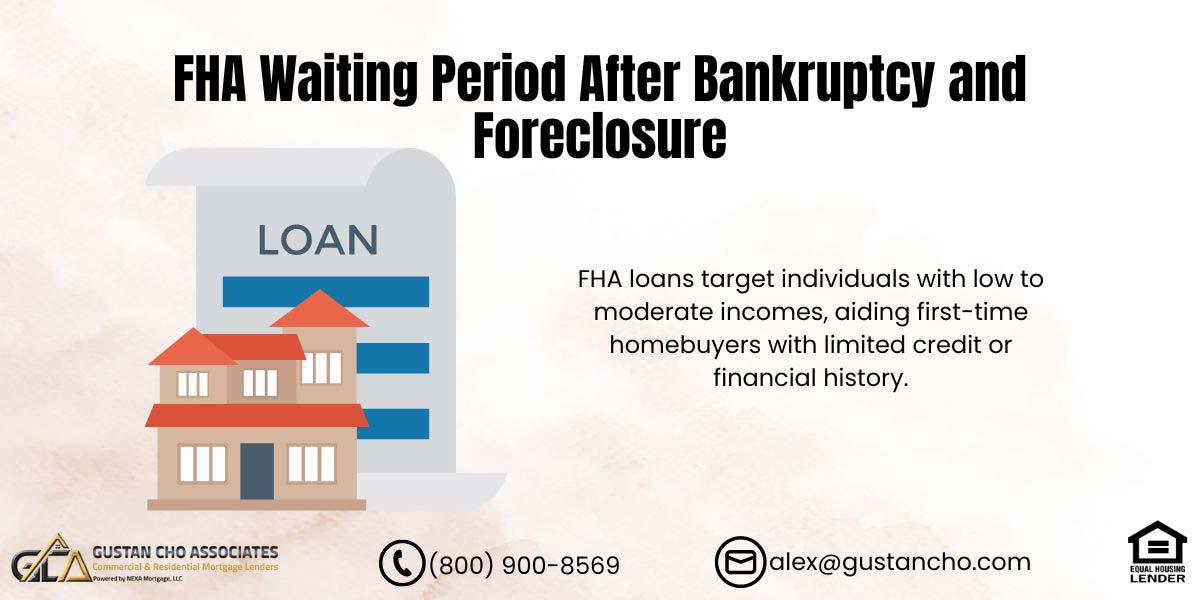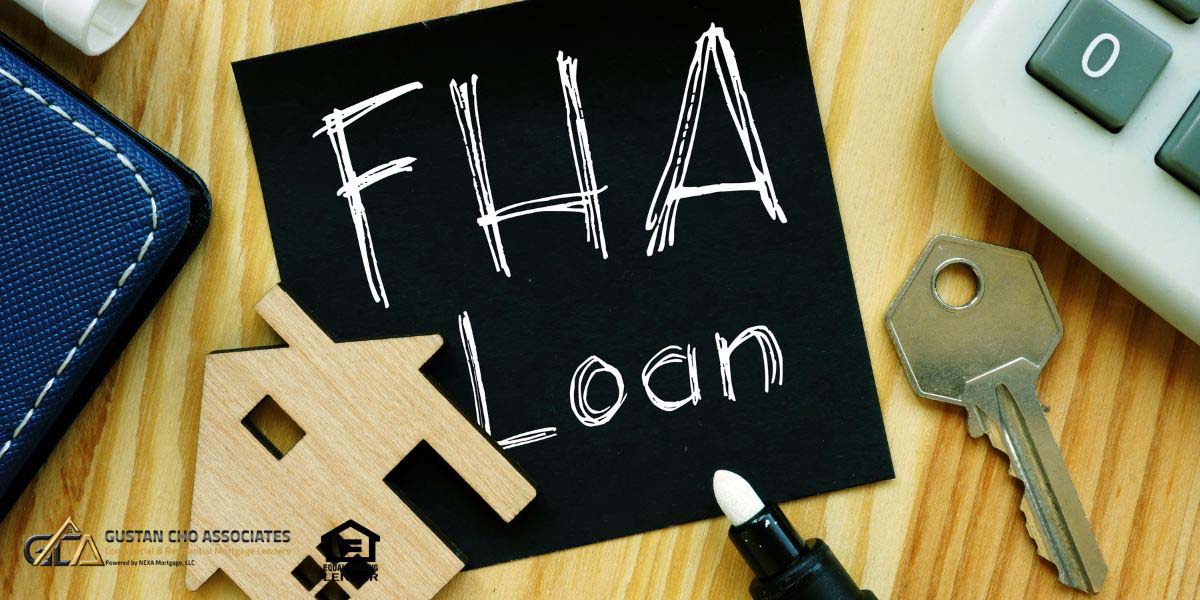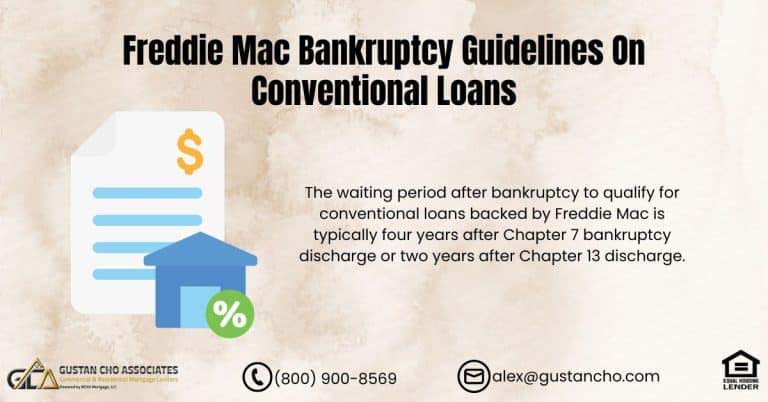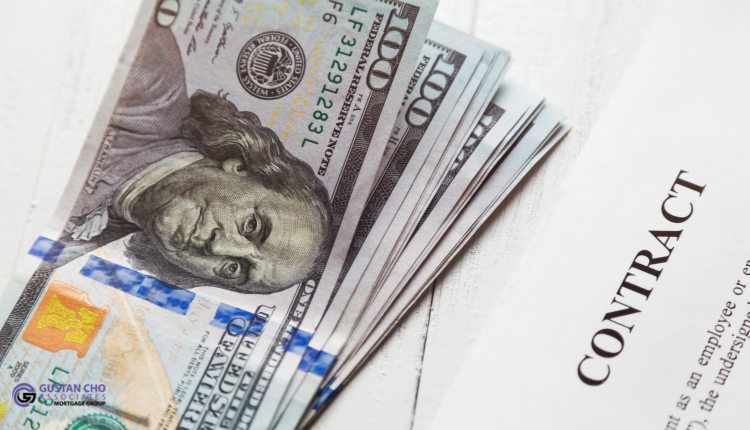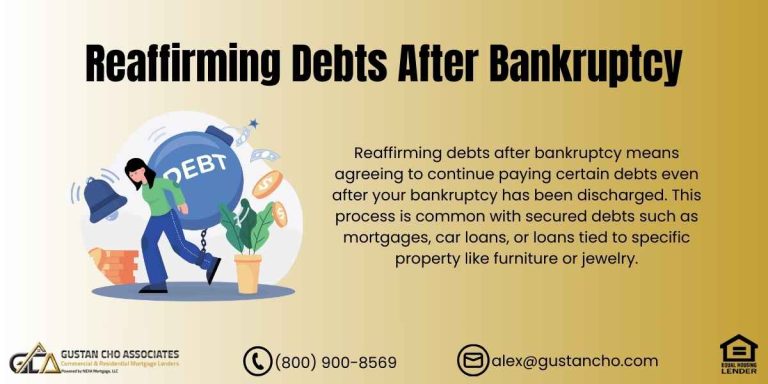This article will discuss the FHA Waiting Period After Bankruptcy and Foreclosure. The FHA mandates waiting periods after bankruptcy, foreclosure, and short sales for loan qualification. HUD guidelines specify these waiting periods. FHA loans target individuals with low to moderate incomes, aiding first-time homebuyers with limited credit or financial history. Dale Elenteny, a senior loan officer at Gustan Cho Associates, highlights the advantages of FHA loans:
FHA loans have lenient mortgage guidelines, accepting credit scores as low as 500 FICO, high debt-to-income ratios, outstanding collections, and late payments within the past 12 months, with a larger down payment.
FHA loans allow the purchase or refinance of various properties like single-family homes, condominiums, townhomes, and manufactured homes. HUD, overseeing FHA, establishes and enforces qualification standards through FHA guidelines detailed in the HUD 4000.1 FHA Handbook.
What Is an FHA Loan?
A mortgage supported by the Federal Housing Administration (FHA) is an FHA loan. This backing means that if you default on your loan, the FHA will compensate the lender for a portion of the loan amount. Lenders can offer borrowers more favorable terms because of this arrangement, which reduces their risk.
Getting a conventional loan for a home purchase can be challenging if you’ve gone through a significant credit event like bankruptcy, foreclosure, short sale, or deed-in-lieu. However, an FHA loan can be a solution in such situations. This article will outline how FHA loans can assist you in buying a home after experiencing a credit event.
Furthermore, it is worth noting that FHA loans provide the option to finance the purchase of a property that requires repairs, including the ability to include renovation costs in the loan through the 203(k) loan program. FHA loans also support purchases of homes with energy-efficient features, utilizing an Energy Efficient Mortgage (EEM). The following sections will discuss the FHA waiting period after bankruptcy and foreclosure, providing guidelines for borrowers in these situations.
Bankruptcy or Foreclosure in Your Past? You May Still Qualify for FHA
FHA loans offer shorter waiting periods than conventional loans. We’ll help you understand your timeline and options.
How Does an FHA Loan Work?
When applying for an FHA loan, you must go through an FHA-approved lender, such as a bank, credit union, or online lender. Your eligibility and loan amount will be assessed based on income, credit score, debt-to-income ratio, and other relevant considerations.
When obtaining an FHA loan, it’s important to note that there are some associated costs. These include an upfront mortgage insurance premium (UFMIP) of 1.75% of the loan amount and an annual mortgage insurance premium (MIP) of 0.55% on a 30-year fixed-rate FHA loan.
In contrast, conventional loans do not require upfront mortgage insurance like FHA loans. Additionally, FHA MIP cannot be canceled during the 30-year fixed-rate term. The FHA mortgage insurance premium rate varies depending on the loan term and loan-to-value ratio. A down payment is also required, which is 3.5% of the purchase price for credit scores of 580 or higher.
For credit scores between 500 and 579, HUD (the parent of FHA) requires a down payment of at least 10%. Down payment sources include savings, gifts from family or friends, grants, or loans from nonprofit organizations or government agencies.
Regarding the FHA waiting period after bankruptcy and foreclosure, FHA loans typically require two years after bankruptcy discharge and three years after foreclosure completion before you can qualify for a new FHA loan. These waiting periods may vary based on individual circumstances and lender requirements, so it’s essential to consult with an FHA-approved lender for accurate information.
What is the Waiting Period for a FHA Bankruptcy?
The 4000.1 FHA handbook sets all of the FHA Guidelines. FHA waiting period after bankruptcy and foreclosure guidelines require a mandatory 2-year waiting period after Chapter 7 Bankruptcy. Borrowers can qualify for FHA loans one year into a Chapter 13 Bankruptcy Repayment Plan with Trustee Approval.
Bankruptcy is a procedure under the law that allows individuals to either eliminate or restructure their debts with the protection of a court. There are two main types of bankruptcy for individuals: Chapter 7 and Chapter 13. Under Chapter 7, nonexempt assets are liquidated, and most debts are discharged. Chapter 13 involves debt restructuring and the establishment of a three to five-year repayment plan.
Its important to note that bankruptcy can stay recorded on your credit report for up to 10 years and significantly impact your credit score. However, if you have undergone a Chapter 7 bankruptcy, you can be eligible for an FHA loan after two years. For a Chapter 13 bankruptcy, you may apply after one year of completing the repayment plan, provided you have reestablished good credit and have no other negative items on your credit report.
FHA Loans After Foreclosure and Housing Event
If a borrower has gone through a foreclosure, the legal process of lenders seizing and selling a home to recover unpaid loan balances, they may still be eligible for an FHA loan. Foreclosure can occur when mortgage payments are defaulted for more than 90 days without remedy.
It’s essential to remember that if you have undergone a foreclosure, it could stay on your credit report for up to seven years. This can have a significant impact on your credit score. To qualify for an FHA loan three years after foreclosure, borrowers must re-establish good credit and no other derogatory items on their credit report.
The FHA imposes a three-year waiting period after foreclosure, deed-in-lieu of foreclosure, and short sale to qualify for their loans. Homebuyers aiming for a 3.5% down payment FHA loan must meet a 580 credit score requirement. This discussion will explore the FHA waiting period after bankruptcy and foreclosure guidelines.
FHA Loans After a Deed-In-Lieu of Foreclosure
After a deed-in-lieu, borrowers are eligible for an FHA loan, with an FHA waiting period after bankruptcy and foreclosure. A deed-in-lieu occurs when homeowners transfer home ownership to the lender voluntarily, often due to financial hardship or being underwater on the property.
This action can impact credit reports for up to seven years, significantly decreasing credit scores. The FHA waiting period after a deed-in-lieu of foreclosure begins either from the deed transfer date to the lender or new owner or from the sheriff’s sale date.
Applicants can apply for an FHA loan three years after a deed-in-lieu, provided they have reestablished good credit and have no other derogatory items on their credit report.
Get Back Into Homeownership Sooner Than You Think
FHA guidelines allow you to buy again 2–3 years after bankruptcy or foreclosure—with the right documentation.
FHA Loans After a Short Sale
Homebuyers may qualify for an FHA loan after a short sale, a process where a home is sold for less than the mortgage balance with lender approval. Short sales often result from financial challenges or a home’s market value below its loan balance. This event can impact credit reports for up to seven years, lowering credit scores significantly.
However, you could become eligible for an FHA loan three years after a short sale, provided you’ve rebuilt good credit and have no other derogatory items, adhering to the FHA waiting period after bankruptcy and foreclosure.
FHA Waiting Period After Chapter 7 Bankruptcy Discharge
The FHA waiting period after bankruptcy and foreclosure is a crucial aspect of FHA loans. Here’s the revised content with the keywords included:
Chapter 7 Bankruptcy is a process of total debt liquidation, often used by consumers overwhelmed with debts and unable to catch up on payments. This federal tool allows individuals to seek court discharge of their debts, providing a fresh start financially. Consumers typically file Chapter 7 Bankruptcy due to job loss, business closure, divorce, medical reasons, or inability to manage debts with reduced income or unemployment.
Understanding the FHA waiting period after bankruptcy and foreclosure is important for those considering FHA loans.
Debts That Can Be Discharged In Chapter 7 Bankruptcy
A Chapter 7 Bankruptcy will discharge most debts, including:
- collection accounts
- charge off accounts
- outstanding utility bills and cellular bills
- civil judgments
- tax liens
- wage garnishments
- personal debts
- repossessions
- any other personal and business debts
The only debts not dischargeable are government debts such as taxes, court fines, child and alimony payments, fines from government agencies, and federal student loans.
Debts That Cannot Be Discharged In Chapter 7 Bankruptcy
Debts that cannot be discharged through a Chapter 7 Bankruptcy are the following debts:
- government debts
- federally backed student loans
- tax liens
- fines owing to the government
- child support payments
- alimony payments
- federal taxes
- state taxes
- county and local taxes
- fines imposed by any local, county, state, and federal government agencies
FHA Loan After Chapter 7 Bankruptcy
Homebuyers who have received a Chapter 7 Bankruptcy discharge are eligible for an FHA loan if they meet the waiting period requirements established by the FHA. This waiting period is also applicable for those who have faced foreclosure. The waiting period for FHA loans after bankruptcy and foreclosure is two years.
This eligibility requires no late payments or negative credit incidents post-bankruptcy. Suppose you have gone through a Chapter 7 Bankruptcy and want an FHA loan with a 3.5% down payment. In that case, it is important to note that a minimum credit score of 580 is necessary for eligibility. Alternatively, buyers with credit scores below 580 can still qualify with a 10% down payment and other compensating factors.
FHA loans accommodate a higher debt-to-income ratio (DTI) of up to 46.9% front-end and 56.9% back-end, compared to conventional loans with a maximum of 50% DTI. Lenders prefer to see borrowers who have re-established credit following a Chapter 7 Bankruptcy and met the FHA waiting period after foreclosure. They are cautious about any late payments after that.
However, late payments post-bankruptcy are relatively inexpensive as long as borrowers meet the approval criteria set by Automated Underwriting System Findings.
FHA Waiting Period After Chapter 13 Bankruptcy
A Chapter 13 Bankruptcy is also called a debt restructuring plan. Consumers get appointed a Chapter 13 Bankruptcy Trustee. The Trustee will review the petitioner’s income from the Chapter 13 Bankruptcy and allocate some of their income to creditors. The trustee will allocate that portion to the list of the petitioner’s creditors for a period, normally between three to five years. After the repayment plan, the remaining debts owed to the consumer’s creditors are discharged or wiped off.
FHA Loan Requirements on Chapter 13 Bankruptcy
After completing Chapter 13 Bankruptcy and becoming debt-free, individuals can begin anew financially. To be eligible for Chapter 13 Bankruptcy, applicants must have documented income from employment. Those without employment cannot qualify for Chapter 13 Bankruptcy. If you have been through Chapter 13 Bankruptcy, you may be eligible for an FHA loan after one year.
This is possible if you have made all credit payments on time for the past 12 months and have received approval from the Chapter 13 Bankruptcy Trustee. This timing is part of the FHA waiting period after bankruptcy and foreclosure.
Qualifying For FHA Loan During Chapter 13 Repayment Period
After completing Chapter 13 Bankruptcy and becoming debt-free, individuals can begin anew financially. To be eligible for Chapter 13 Bankruptcy, applicants must have documented income from employment. Those without employment cannot qualify for Chapter 13 Bankruptcy.
If you have been through Chapter 13 Bankruptcy, you may be eligible for an FHA loan after one year through manual underwriting. Any Chapter 13 Bankruptcy FHA Loan applications under two years of discharge will not be approve/eligible per DU FINDINGS.This is possible if you have made all credit payments on time for the past 12 months and have received approval from the Chapter 13 Bankruptcy Trustee. This timing is part of the FHA waiting period after bankruptcy and foreclosure.
FHA Waiting Period After Foreclosure, Deed-In-Lieu of Foreclosure, Short Sale
The FHA waiting period after bankruptcy and foreclosure starts from the recorded date or the date of the sheriff’s foreclosure sale and deed-in-lieu of foreclosure. Similarly, there is a three-year waiting period from the short sale date and from the date of a mortgage charge-off or second mortgage charge-off to qualify for FHA home loans. Lenders also stress the significance of avoiding late payments after a foreclosure, deed-in-lieu of foreclosure, or short sale.
Don’t Guess Your Waiting Period—Know It
We’ll review your bankruptcy or foreclosure date and let you know when you can qualify for FHA financing.
Mortgage Rates With a Prior Bankruptcy and Foreclosure
It’s a common misconception that a prior bankruptcy, foreclosure, deed-in-lieu of foreclosure, or short sale will lead to higher mortgage rates, particularly regarding FHA loans. Alex Carlucci, a senior loan officer and team leader at Gustan Cho Associates, clarifies the impact of these events on mortgage rates, specifically mentioning the FHA waiting period after bankruptcy and foreclosure:
Contrary to belief, a bankruptcy or foreclosure does not affect the pricing of mortgage rates on FHA loans, nor are there loan-level pricing adjustments based on these events for FHA loans.
Credit scores are the primary determinant of mortgage rates for FHA loans. In contrast, conventional loans consider credit scores and loan-to-value ratios for rate determination. Previous bankruptcy or foreclosure does not impact the interest rates borrowers receive during the FHA waiting period after bankruptcy and foreclosure. There are no pricing adjustments for these events on FHA mortgage rates.
What Are the Benefits of an FHA Loan?
As an illustration, after a Chapter 7 bankruptcy discharge, you can qualify for an FHA loan in as little as two years, and after a foreclosure, you may be eligible in three years. More flexible underwriting guidelines: The FHA has more lenient underwriting standards than conventional lenders and may consider compensating factors such as your employment history, savings, reserves, or payment history when evaluating your loan application.
What Are the Drawbacks of an FHA Loan?
An FHA loan also has some disadvantages you should know before applying. Some of these drawbacks are Higher mortgage insurance costs: You will have to pay both an upfront and an annual mortgage insurance premium for an FHA loan, which can add to your monthly payments and closing costs.
You will have to pay the annual MIP for the life of the loan or at least 11 years, depending on your down payment and loan term, whereas you can cancel the private mortgage insurance (PMI) for a conventional loan once you gained 20% equity in your home.
FHA loans have lower loan limits than conventional loans. The amount you can borrow with an FHA loan is subject to limitations set by the FHA, which vary depending on the county and type of property. As a result, in certain areas, you may find it difficult to purchase a more expensive home using an FHA loan.
HUD Property Standards For FHA Loans
Property condition requirements on FHA loans are the property needs to be safe, habitable, and secure. HUD has strict standards for the condition and quality of the property you want to buy with an FHA loan. The property must meet the minimum property requirements (MPRs) and pass an appraisal by an FHA-approved appraiser.
The MPRs cover various aspects of the property, such as safety, security, soundness, and sanitation. If the property does not meet the MPRs, you may have to ask the seller to make repairs or use a 203(k) loan to finance the repairs.
Conventional Versus FHA Waiting Period After Bankruptcy and Foreclosure
An FHA loan allows you to qualify for a mortgage sooner and with less stringent requirements than a conventional loan. Here are some examples of how an FHA loan can help you buy a home after different credit events. An FHA loan has several advantages for borrowers with a credit event or other challenges in qualifying for a conventional loan.
Some of these benefits are lower credit score requirements: With an FHA loan, you can be eligible even with a credit score as low as 500, which contrasts conventional loans that typically necessitate a minimum score of 620 or higher.
HUD, the parent of FHA, has shorter waiting periods after a credit event versus conventional loans. You can qualify for an FHA loan sooner after a bankruptcy, foreclosure, short sale, or deed-in-lieu than a conventional loan. In comparison, you might need to wait four or seven years in similar circumstances for a conventional loan.
FHA loans have lower down payment requirements: With an FHA loan, you can purchase a home with a minimum down payment of just 3.5%. Conversely, conventional loans generally necessitate a minimum down payment of 5%; in certain cases, they can go as high as 20%—higher debt-to-income ratio limits.
FHA Waiting Period After Bankruptcy and Foreclosure With Late Payments
If borrowers with any late payments after a bankruptcy and housing event are told they do not qualify for an FHA loan, please get in touch with us at 800-900-8569 or email us at alex@gustancho.com. Gustan Cho Associates is available seven days a week, evenings, weekends, and holidays to answer your phone calls and any questions.
An FHA loan can be a way for homebuyers who have had a credit event or have other challenges to qualify for a conventional loan. An FHA loan can offer lower credit score requirements, shorter waiting periods after a credit event, lower down payment requirements, higher debt-to-income ratio limits, and more flexible underwriting guidelines than a conventional loan.
However, an FHA loan also has some drawbacks, such as higher mortgage insurance costs, lower loan limits, property condition requirements, and more paperwork than a conventional loan. Therefore, you should compare different types of loans and lenders before applying for an FHA loan. You should also consult with a mortgage professional and a financial advisor to ensure you can afford the mortgage payments and the long-term costs.
FAQ: FHA Waiting Period After Bankruptcy and Foreclosure
1.What is an FHA Loan? A mortgage guaranteed by the Federal Housing Administration (FHA) is called an FHA loan. This loan aims to assist individuals with lower credit scores or limited funds in qualifying for home loans.
2. How Does an FHA Loan Work? To get an FHA loan, apply through an FHA-approved lender. FHA loans have lower credit score requirements, shorter waiting periods after credit events, and lower down payment requirements than conventional loans.
What Are the Benefits of an FHA Loan?
- Lower credit score requirements (as low as 500 FICO).
- Shorter waiting periods after credit events (e.g., two years after bankruptcy).
- Lower down payment requirements (3.5% minimum).
What Are the Drawbacks of an FHA Loan?
- Higher mortgage insurance costs.
- Lower loan limits.
- Stricter property condition requirements.
What Are the Waiting Periods for FHA Loans After Credit Events?
- Bankruptcy (Chapter 7): 2-year waiting period.
- Bankruptcy (Chapter 13): 1-year waiting period with trustee approval.
- Foreclosure, short sale, deed-in-lieu: 3-year waiting period.
How Do FHA Loans Compare to Conventional Loans?
- Accept lower credit scores.
- Have shorter waiting periods after credit events.
- Require lower down payments.
- Have stricter property standards.
This blog about FHA Waiting Period After Bankruptcy and Foreclosure was updated on April 2nd, 2024.
Bankruptcy or Foreclosure? FHA May Still Be an Option
Find out how long you need to wait—and how to prepare your credit to get approved when the time is right.


